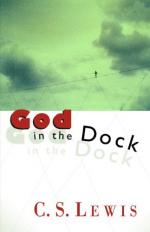
|
| Name: _________________________ | Period: ___________________ |
This test consists of 15 multiple choice questions and 5 short answer questions.
Multiple Choice Questions
1. Lewis suggests that arguments for or against God's existence are which of the following?
(a) Powerful.
(b) Foolish.
(c) Intricate.
(d) All incorrect.
2. According to Lewis, what is the proper way to make probability judgments about events in Christianity?
(a) According to a bell curve of unlikely events.
(b) According to the actions of God.
(c) According to modern science.
(d) According to a sliding scale.
3. In Part I, Essay 23 "Must Our Image of God Go?", Lewis argues against what type of an interpretation of the scripture?
(a) Literal.
(b) Historical.
(c) Modern.
(d) Figurative.
4. What type of doctrines does Lewis suggest that apologetics be used to attack?
(a) Useless doctrines.
(b) Outdated doctrines.
(c) False doctrines.
(d) New doctrines.
5. The terms prayer books often use to describe personal feelings would best be described as which of the following?
(a) Loving.
(b) Deep.
(c) Harsh.
(d) Sensitive.
6. How is Christianity related to spiritualism, according to Lewis?
(a) Spiritualism is a subset of Christian beliefs.
(b) Christianity invalidates spiritualism.
(c) It is not a form of spiritualism.
(d) Spiritualism is equally valid compared to Christianity.
7. The club that Lewis founded took its name from what philosopher?
(a) Kant.
(b) Demosthenes.
(c) Socrates.
(d) Aristotle.
8. What mistake does Lewis claim that Pittenger made in critiquing his books?
(a) He didn't factor in the intended audience.
(b) He misinterpreted the scripture.
(c) He was uninformed on the subject matter.
(d) He left out key arguments.
9. What was the audience for the lecture transcribe in Part I, Essay 10, "Christian Apologetics"?
(a) Clergy.
(b) Students.
(c) Atheists.
(d) Scientists.
10. Corineous asserts that Christianity is which of the following?
(a) Old-fashioned.
(b) Adaptable.
(c) Sophisticated.
(d) Barbaric.
11. Lewis emphasizes what about the evils of World War II?
(a) They were largely undocumented.
(b) They were not unique.
(c) They cannot be completely known.
(d) They were overestimated.
12. Why should the Gospels not be considered legend?
(a) Their authenticity has been proved beyond a doubt.
(b) They are too short.
(c) They are historical documents.
(d) They are not artistic enough.
13. Lewis states that sound value theories demand what of a definition of evil?
(a) It is syntactically identical to good.
(b) It is lacking everything that goodness has.
(c) It is a perversion of good.
(d) It is the opposite of good.
14. Lewis asserts that what is necessary in order to know what is "good"?
(a) Dogma.
(b) Christian faith.
(c) Introspection.
(d) A creed or world view.
15. If Jesus' claims about himself were false, what can be said about his moral teachings?
(a) They are unclear.
(b) They are irrelevant.
(c) They are unchanged.
(d) They are invalid.
Short Answer Questions
1. According to materialism, reasoning is the result of what?
2. The argument that human suffering proves that God does not exist is best described as which of the following?
3. Lewis contends that dualism gives evil what natures?
4. Lewis contends that good and evil powers share what relationship?
5. What element of modern science does Lewis contend to be most problematic for Christianity?
|
This section contains 497 words (approx. 2 pages at 300 words per page) |

|




